For fans of Lord of the Rings, The Hobbit, Middle Earth and Peter Jackson’s work in general, a visit to the Hobbiton Movie set in Matamata is an experience you won’t want to miss. Yes, that is a bit of a spoiler up front but I’m still buzzing from it 8 weeks later.
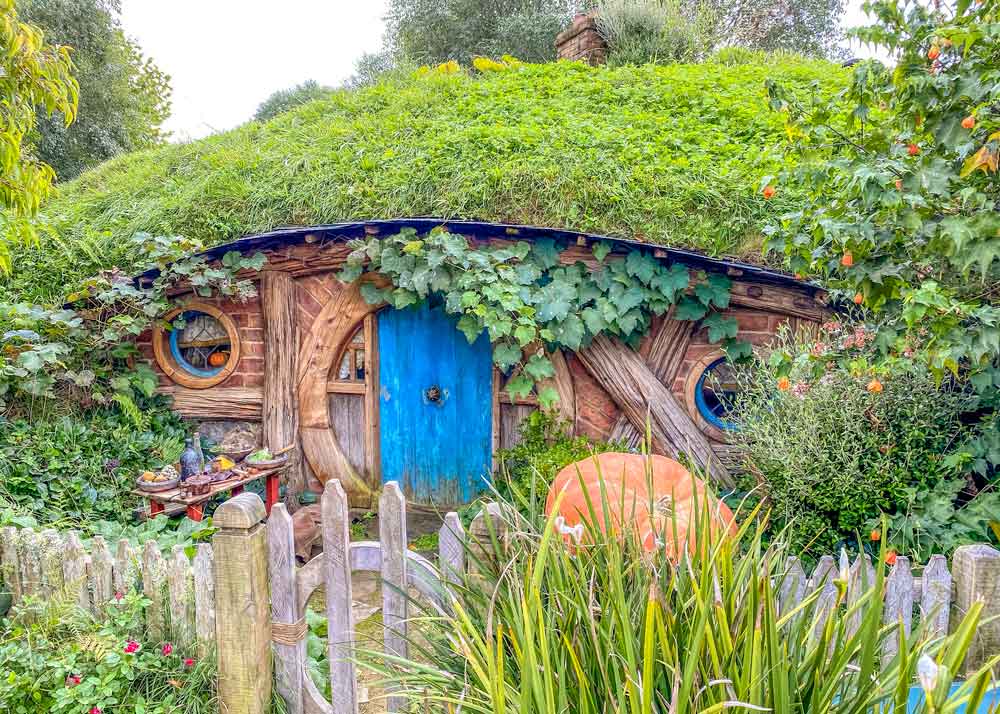
We won’t leave it there though, we’ll discuss what the options are for visiting, whether we felt the tour was worth the ticket price and an overview of the Hobbiton experience so you can make your own assessment. We’ll also cover off on a few other Lord of the Rings fan-related experiences around New Zealand.
Table of Contents
What is Hobbiton?
One of the first things to address is what Hobbiton actually is. I have to admit I really didn’t have much idea what to expect when I was planning our trip beyond my initial thought process of “Lord of the Rings … Hobbiton … Peter Jackson … of course we are going!”
Rather than being a theme park Hobbiton is an enormous outdoor movie set frozen in time. There aren’t characters walking around in costume but what we did get far more than I could have expected was the feeling of being picked up and deposited directly into Middle Earth for the afternoon.
Just to put you in the frame, here’s a short clip from the film taken on the Hobbiton movie set.
Getting to the Hobbiton Movie Set
We drove through from Rotorua on the way to Auckland in the final stage of our road trip. The rolling rural landscape you drive through already feels familiar and you find yourself checking the lumps and bumps in the pasture carefully in case you spot something out of the ordinary, a small chimney protruding from a hillock perhaps or an unexplained pumpkin patch?
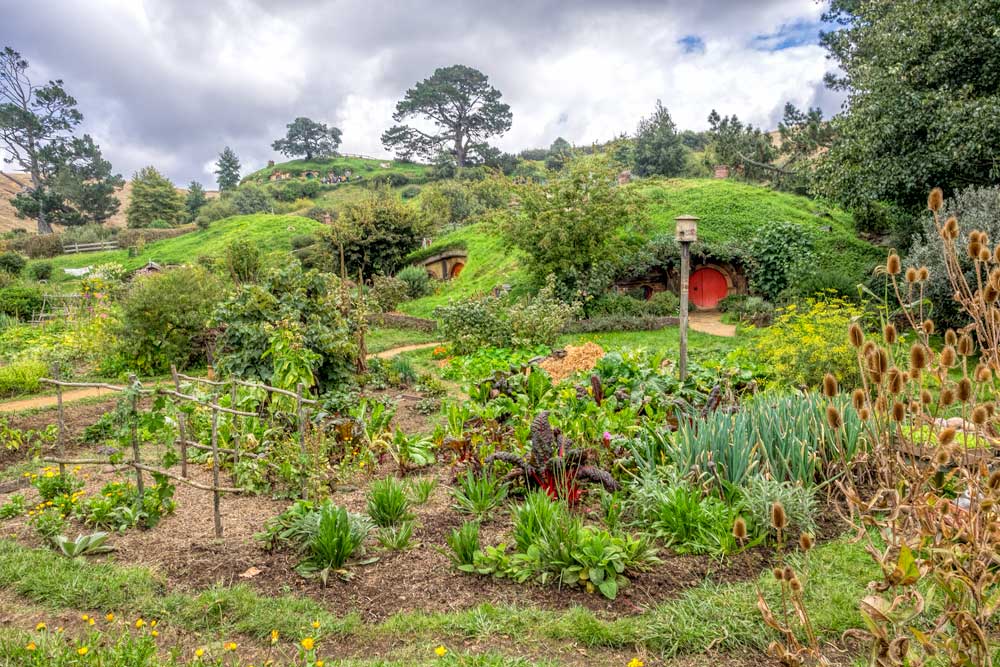
When you arrive there is a massive car park, even on a busy day you’d get a park here if you drive yourself as we did. You don’t need your own transport though, several companies run day tours from Auckland and you can team it up with the Waitomo Caves, another fabulous attraction in the Waikato area that we highly recommend.
We booked all out tours and activity tickets on this trip with Klook. Their prices are competitive and the service excellent. One trip, our kayaking on Lake Rotorua was cancelled due to high winds and they were proactive with information, gave us alternative dates and had no issues with processing refunds when we couldn’t take up a different day’s tour.
When is the best time to visit Hobbiton?
The site has been set up to operate all year round so from that perspective there isn’t anyone right time. They also put a lot of work into consistency to have it looking lush and hobbit ready at all times.
Do keep in mind that this is an outdoor movie set and apart from a drink at the Green Dragon Inn at the end and the time in the bus you will be outside for the whole tour. Make sure you are equipped with sun protection in summer, for the biting cold wind in winter and the potential for rain at any time of year. Tours go ahead regardless of weather and they do provide large umbrellas to use if it is raining.
The movie set is just under 5-hectares so you will be on your feet and walking around the gravel paths most of the time. It’s easy walking but a bit hilly so make sure to wear comfortable shoes.
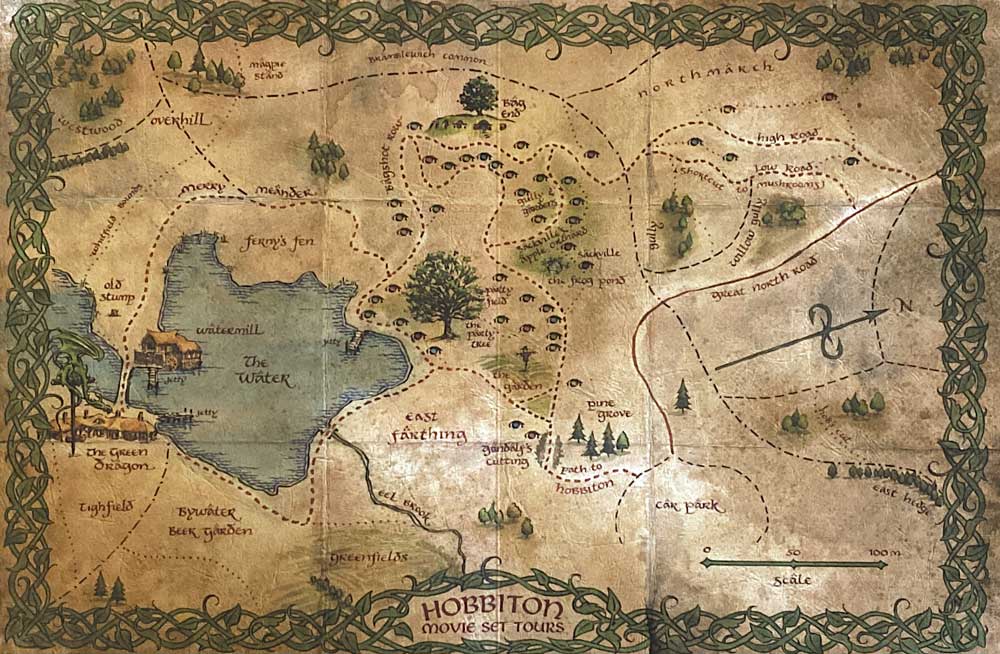
The site is not wheelchair accessible but if you have particular needs they do try to meet them so try contacting them directly to check in advance.
During school holidays and summer it is especially busy, making it essential to book ahead. Given the appeal to international visitors too there isn’t a really quiet time.
As for the time of day, this is most relevant for photography, any time will offer great viewing opportunities. The light will be a little better in the morning but the afternoon tours are slightly less busy so you have a better chance of a smaller group.
The Hobbiton Experience
From the car park area, you follow the paths around to The Shires Rest and ticketing office. We had booked tickets online and with the way things panned out on the day we arrived a few hours early. They managed to slot us onto a tour leaving around 25 minutes later giving us just enough time for a coffee.
That said I am still pleased we did book ahead, it was a relatively quiet day when we went, the borders were starting to close with the pandemic, but I’ve heard it can be quite busy and there’s not really anything else around if you have a long wait.
The Shires Rest
We grabbed a table and sat out looking across the lush Waikato farmland. They give you a small device that looks like a buzzer but it’s a tracker so they can deliver your drinks or meals directly to you while they are hot as the place is quite large with tables indoors, on the deck, patio and out on the grass. Incidentally, they make a decent coffee.
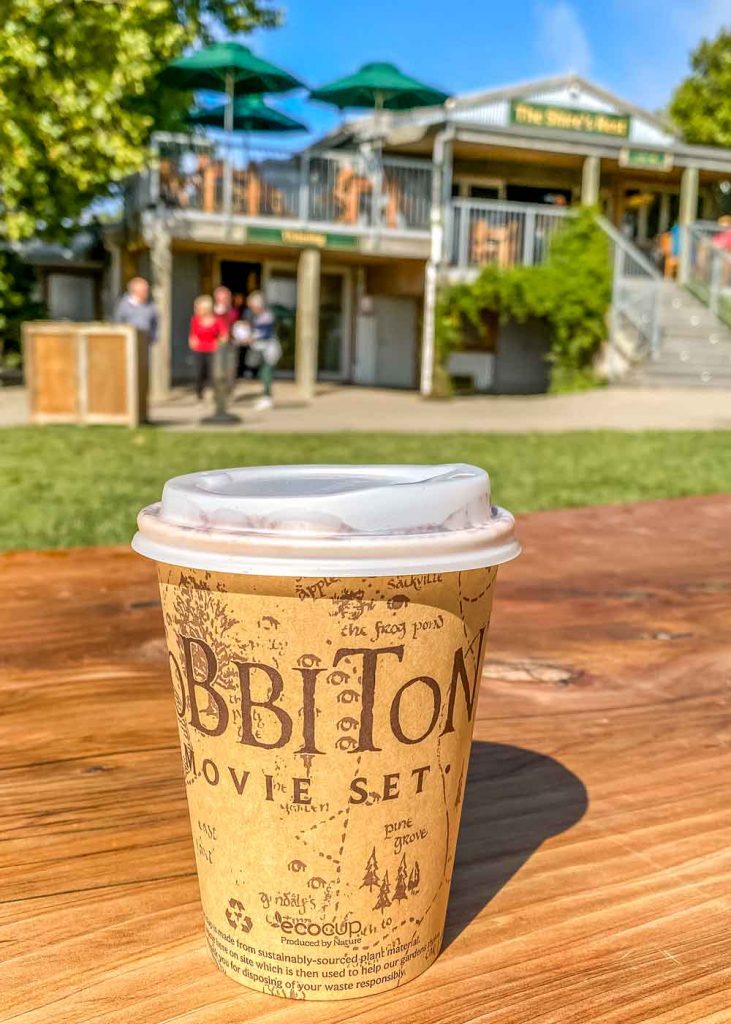
If you want something more substantial there is a range of meals and snacks available which might suit a lot of people who are doing the tour as they pass through on the way somewhere else as we did. Other food options are about 20 minutes away in either Tirau or Matamata.
As the tour gets underway ..
I had expected it would be a popular tour but hadn’t realised just how many people they are set up to put through the set each day. It’s a well oiled process and once you are underway it’s well spaced and organised so you don’t feel rushed or crowded by groups backing up on each other.
Outside the cafe and ticket office, there is the boarding area and at this point you do feel a little as if you are being rounded up into the sheep corrals. I guess that’s appropriate on what was once a sheep farm in rural Waikato. There are 4 rows, one for each of the next 4 tours. When you collect your ticket you are asked to be here 10-minutes before the start time so every tour gets away exactly on time.
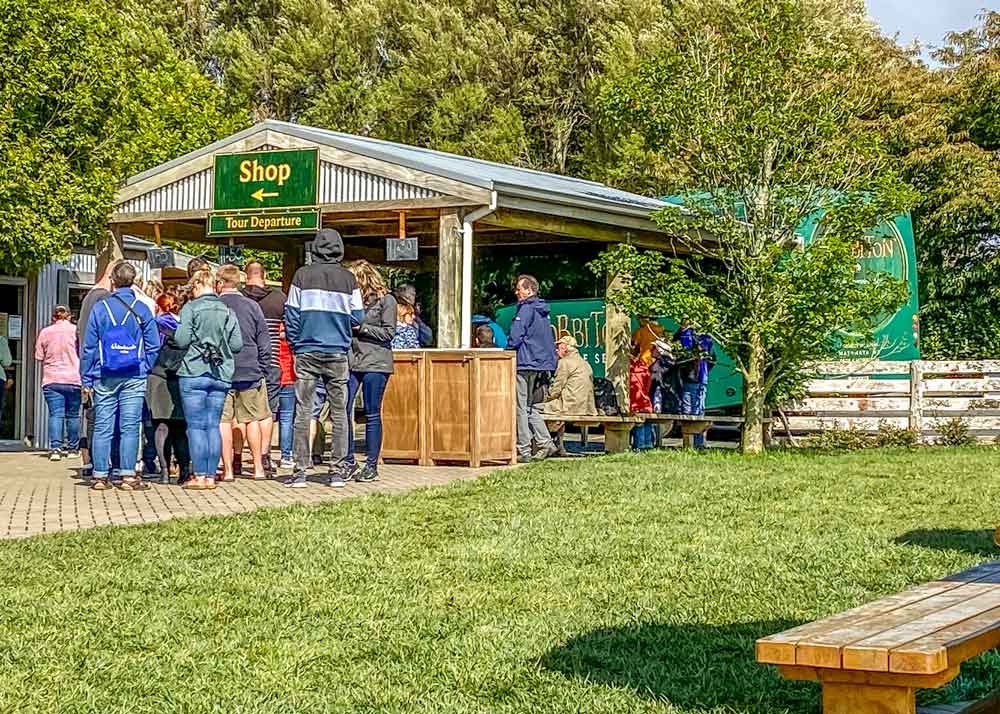
Once your bus pulls up and every one is loaded on you are off and it’s showtime from the start. On the bus, there are interviews recorded with the Alexander family who owns the farm, and Peter Jackson, you are also shown some excerpts from the movies that get you into the frame of mind for what you are about to see but also remind you of some key scenes if you haven’t watched the movies recently.
There are some specific rules laid out at the start. You must stay with the guide, not get in front or behind the group, not touch or enter anything unless you are specifically told you can, and don’t step on the grass. The guides do an excellent job of keeping the directions fresh in your mind throughout the tour without coming across as dictatorial or unreasonable.
During the tour, you quickly begin to see why the rules matter so much. This isn’t just ‘the old Hobbit set’ it looks exactly as it would have on that last morning of filming after the crew had signed off the final continuity checks. It doesn’t matter what time of year you come here, or what time of day, you will step into Hobbiton looking exactly as it is etched into your memory.

The cottage gardens flower brightly day in and day out through the hot summers and cold winters. Even the grass is constantly manicured across the entire site for the exact right look. When we visited the area it was suffering the worst drought it has in some years, many farmers paddocks were brown but at Hobbiton is a bright verdant green.
To match what you expect to see it needs to look like the sheep have nibbled it to the perfect length, be lush and soft, be neatly trimmed but not look like someone mowed it. Obviously a groundsman with that responsibility can’t contend with thousands of feet stepping on it every day turning it to dust or mud depending on the season.
How did the Hobbiton Movie Set come about?
I’ve read that when Sir Peter Jackson was a teenager, reading Lord of the Rings himself, he travelled from Wellington to Auckland by train and was taken by how ‘Middle Earth’ the scenery beyond the train window appeared, particularly the Waikato region. Having taken the Northern Explorer train trip ourselves I know exactly what he means.

Not surprisingly in 1998 as he sought filming locations for The Lord of the Rings trilogy an aerial search was done of the Waikato. During the flight the Alexander Farm was spotted, specifically, the ‘party tree’ standing alone in the middle of a paddock, near a large pond, below rolling hills exactly as described in the books, he’d found the site.

in March 1999 construction began to create his vision. The New Zealand army came in and created the road into the site, for Lord of the Rings the 39 hobbit holes were created out of temporary materials, untreated timber, ply and polystyrene but 10 years later when they were rebuilt for The Hobbit trilogy it took 2 years for them to create it from permanent materials as we see it today.
The Hobbit Holes
While hobbits, and hobbit actors, are slightly shorter than average it was interesting to see how the set caters for this with 3 sizes of holes. Some are at 100% scale so it’s in proportion to an actual hobbit and others are larger to make the hobbits actors appear small while a few are on a smaller scale to make dwarves appear much larger.

Attention to detail
There are a few details that just blew me away and show just how exacting Peter Jackson’s vision was. The first is the oak tree above Bag End. Of course, there had to be one, it’s described in the book but there wasn’t one on the farm.
To make it as realistic as possible they sourced a large oak tree within the Waikato that was chopped down and placed on location. An entire tree’s worth of individual fake oak leaves was then commissioned from overseas and hand-wired into place. The result is a tree that is hard to tell hasn’t always grown there, even when you know the story.
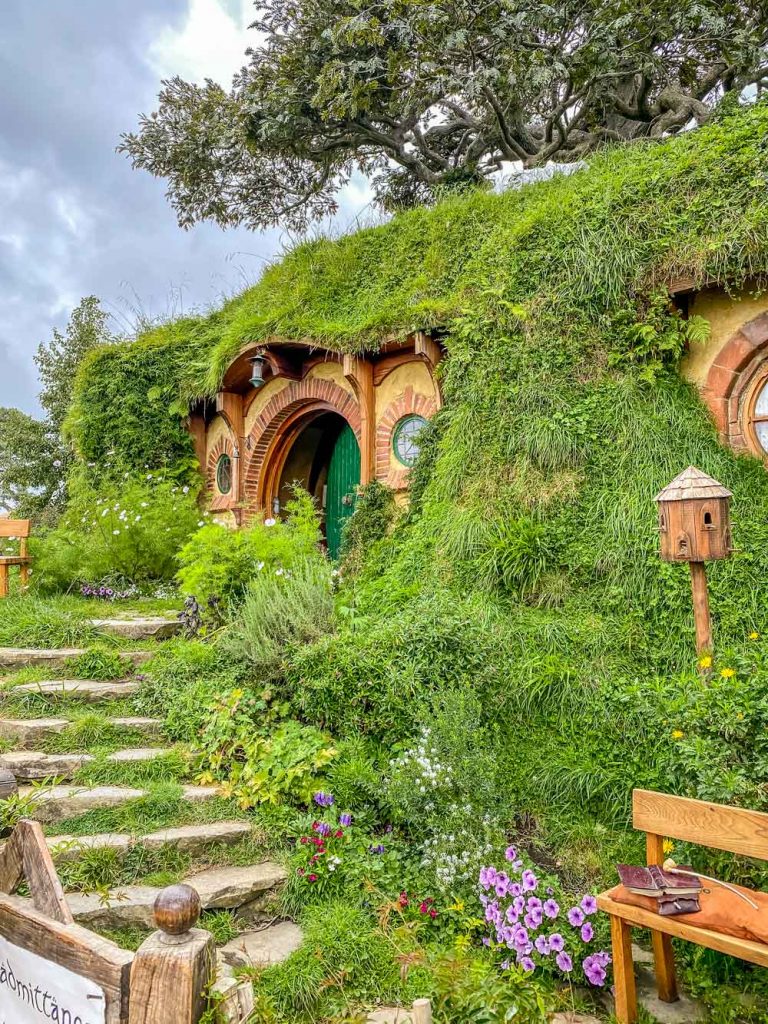
Other details include the ‘plum’ trees. While Lord of the Rings books mention children playing under plum trees they were deemed too large to be in scale for a Hobbit village and instead apple and pear trees were planted. Then any apples and plums had to be picked off and fake plums wired into place for filming.
Sheep were another unusual detail. As you drove in through the Waikato you couldn’t help but notice that you are in sheep country. Hobbiton itself is located within a 500-hectare sheep farm with over 10,000 sheep but not one of them made the casting cut being deemed too modern looking. Suffolk sheep, a heritage breed with dark heads and legs had to be brought in from the South Island to fulfil the necessary look on set.
Enjoy a drink at the Green Dragon Inn
At the end of the tour you wind your way down the hill overlooking the pond, past more hobbit holes and The Mill to the Green Dragon Inn. The tour includes a refreshment stop here with your choice of drinks brewed specifically for Hobbiton.

Choose from the light and malty Girdley Amber Ale, the in-you-face Oatbarton dark ale, the refreshing Sackville cider with reminiscent of bright Granny Smith Apples and for those who prefer a non-alcoholic option they have Frogmorton Gingerbeer, a sweet and spicy drink with a bit of zing.
Inside is completely in theme, even the bathrooms, so make the time to go even if you don’t need to. The drinks are on tap and you can buy snacks to go with it if you want to. The open fire was even lit making it cozy and inviting.
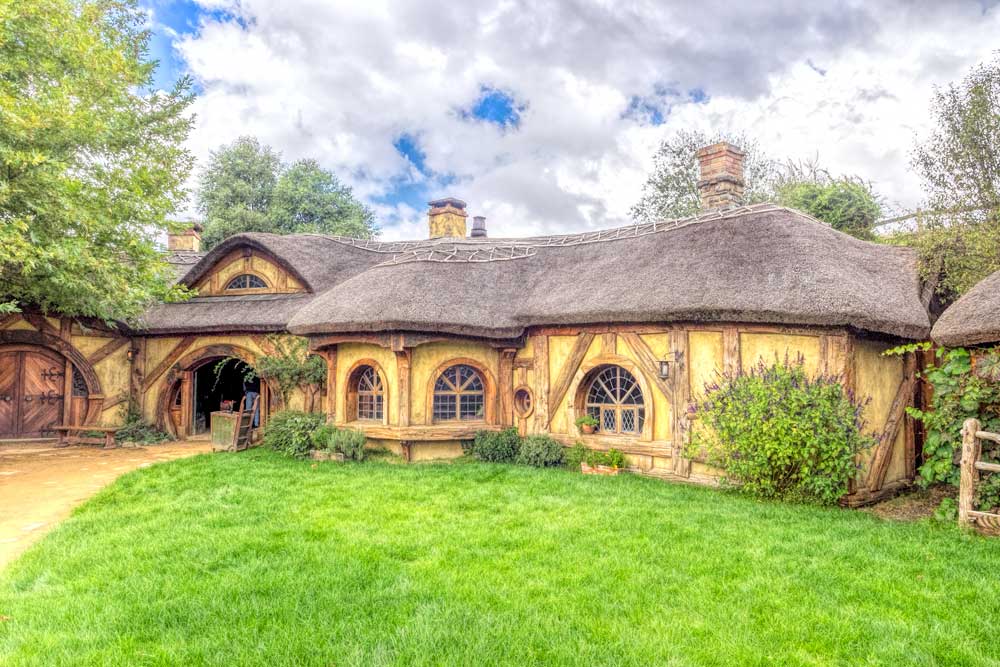
You do have limited time here as your guide needs to round you all up again after 20 minutes or so and return you to the bus for the ride back to the Shires Rest.
Is the tour worth the price
The only way to view the set is on an organised tour, there’s no self-guided option and with the benefit of hindsight that makes sense from two perspectives. Firstly the narrative on the tour is extremely informative and gives all sorts of insights into how the location was chosen, built and used. Secondly, they maintain almost everything with the same continuity and precision as it was during filming, that means everything is not as it appears and that certain things can’t be touched.
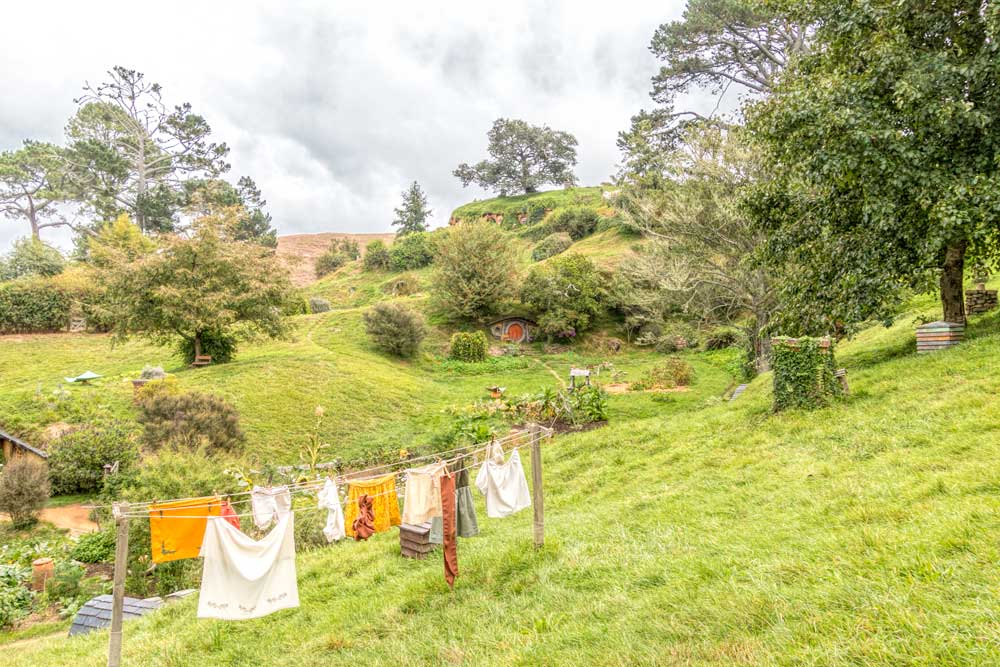
Hobbiton ticket prices and options
The tickets aren’t a budget option but for fans of the books and movies, it is a unique experience. This isn’t a theme park built to resemble the set, it is the actual outdoor set for the Shire, the only one. You stand where the characters did in the film.
For fans and those with an interest in film making, I’d say it is absolutely worth a visit. It’s not something I’d do twice but definitely something I had on my bucket list and I’m really happy I got the chance to go. As I said at the start I’m still buzzing about it now as I go through the photos and remember the backstory weeks later.

If you only have a passing interest or just want to snap a few photos for Instagram I’d probably give it a miss. While you’ll appreciate the impressive effort in the creation there are probably other attractions within the Waikato region you’d want to allocate your limited time to.
You can also visit Lord of the Rings sites in the Wellington area including a behind the scenes tour of Weta Workshops, the studio that produced the special effects for the films. This full-day tour includes the studio, Mt Victoria and locations from the Lord of the Rings and The Hobbit movies. It includes pick up and return to your Wellington accommodation.
Sir Peter Jackson co-founded Weta Workshop and other companies in the group, he remains a 1/3 owner but resigned as a company director back in 2016 to continue his focus on directing movies rather than the business administration.
Also in Wellington and not directly related to the LOR but also created by Weta Workshop is the Gallipoli: The Scale of War exhibit at Te Papa museum. Entry to both the museum and special exhibit is free and is an extremely moving account of the ANZAC history with personal accounts woven into the incredible oversized visual displays. I’d highly recommend getting along to this, especially for New Zealanders and Australians.

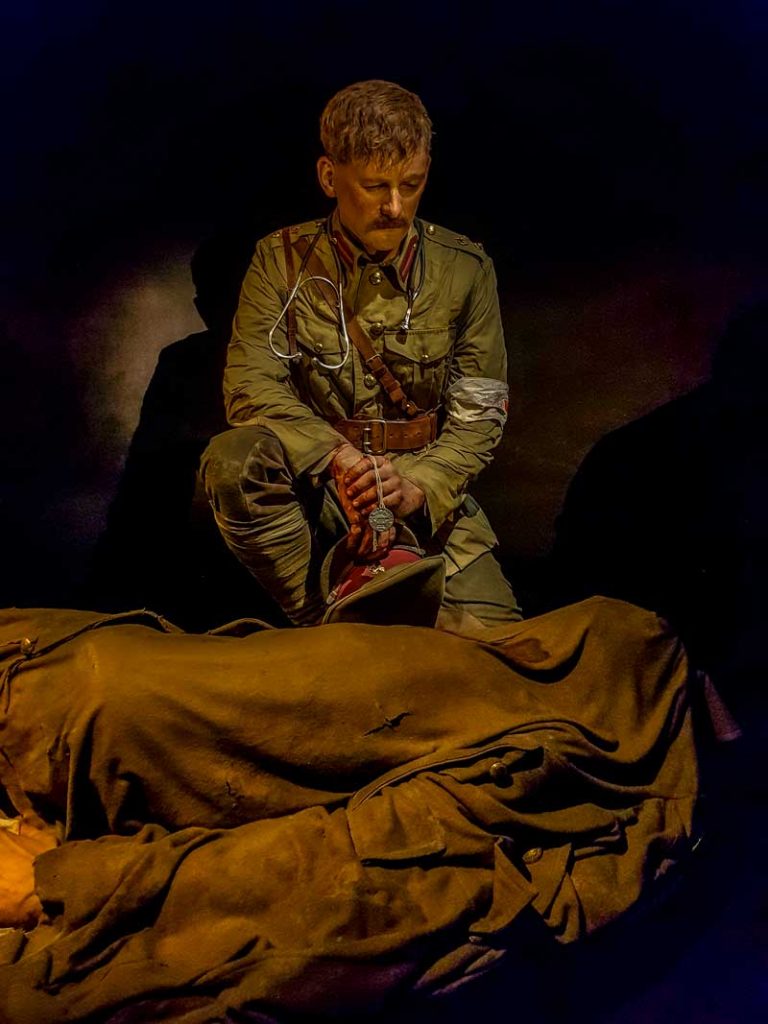
We hope you enjoyed having a look around Hobbiton here today, if you have any questions for us about it or about travelling in New Zealand please do ask in the comments below.
Other articles you might find helpful include:
- Things to do in Auckland
- The best beaches in New Zealand
- Or take a look at our New Zealand catalogue of articles
If you found this article useful please consider saving it to Pinterest. It makes it easy for you to find it again, it helps us, and it helps other travellers to find the information they are looking for.
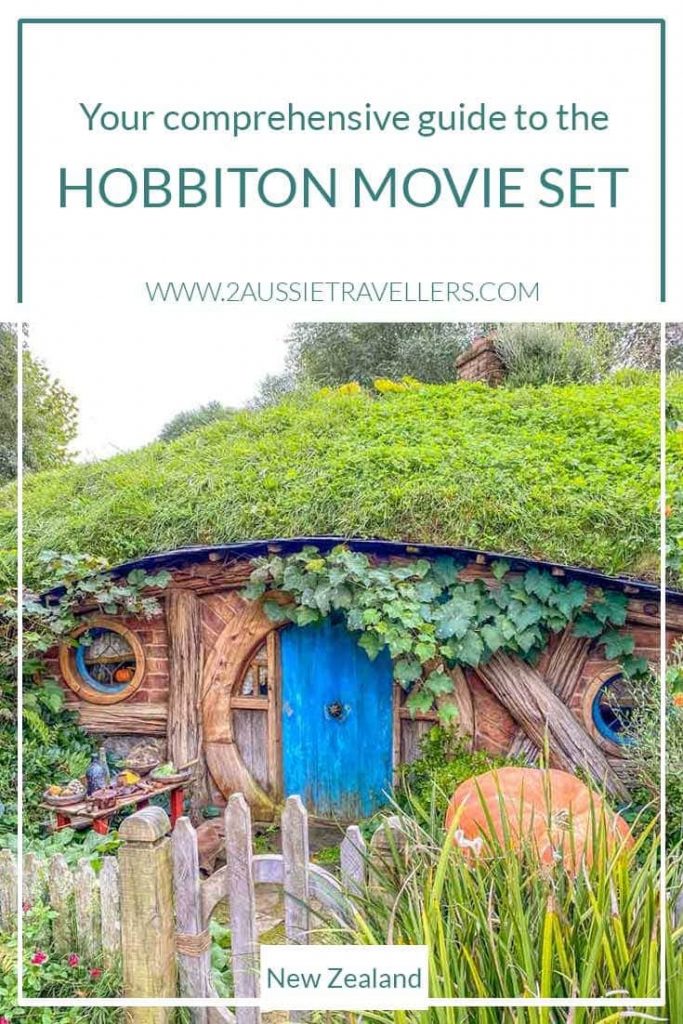

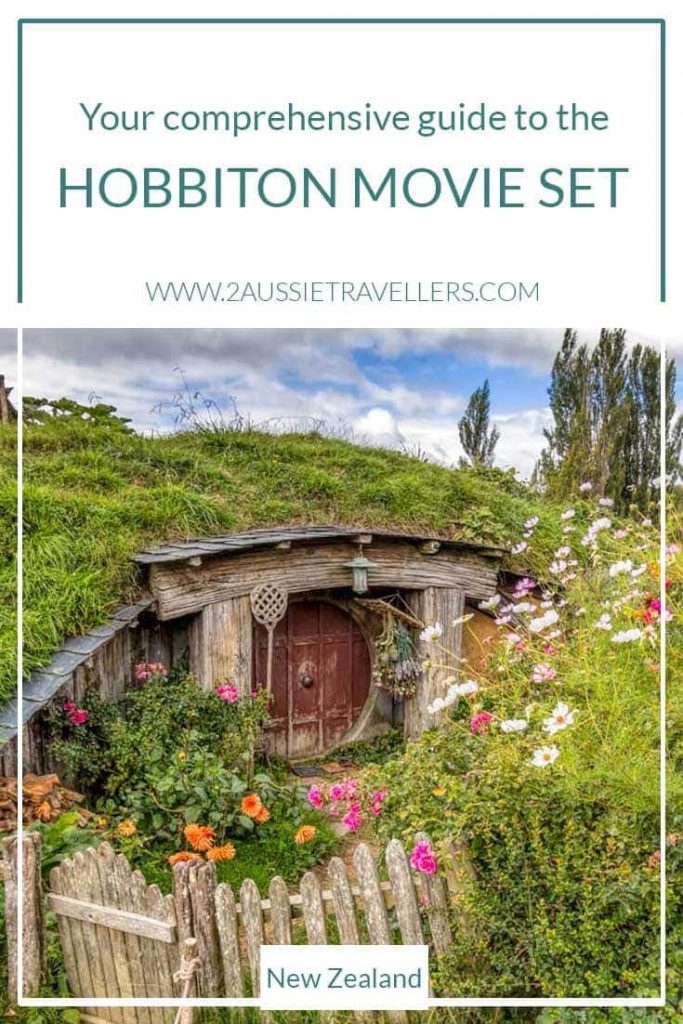
Kirsten
Wednesday 4th of January 2023
Hi there! Thank you so much for such a well written, in-depth and informative blog regarding Hobbiton tours. I am a huge fan of LOTR & THE HOBBIT. I was just wondering if you could please tell me what the best time of day for photos would be? Just thinking the morning is probably to Bright & harsh for photos… may I ask what time you went, as your photos are incredible? Thank you for your time.
Toni Broome
Wednesday 4th of January 2023
Due to our schedule for the day, we arrived late morning and were on-site through the middle of the day which wouldn't have been my first pick as a photographer. It was a bright but overcast day which filtered some of the harshness and it didn't photograph too badly considering. My preference would be earlier in the morning but due to the opening hours there isn't an option for sunrise or dusk, I have seen those photos but they must be either special events or their own photographers. Conversely, the afternoon is less busy so taking wider photos down through the site without stragglers from other groups getting in the shot would be easier but the site is well designed in flow and where the tour groups stop so that you are rarely aware of the group ahead or behind.